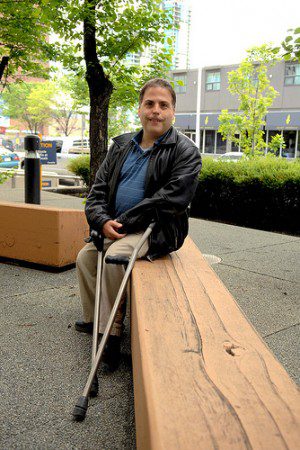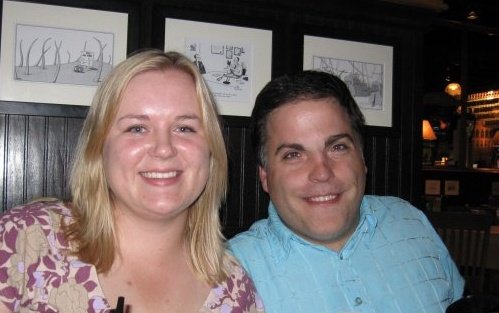
Disability and relationships: my changing perspective
Jon Bateman is a freelance writer living in Calgary, Alberta, Canada. He was born with spina bifida and regularly writes about his experiences as a person living with a disability. Here Jon shares his views on disability and relationships, and how meeting his fiancé has changed his perceptions of dating with a disability.
Three and a half years ago my entire perspective on dating when you have a disability changed. It happened when I met Lisa for a first date; one we had planned after meeting each other online. Up to that point, you could say I was someone who absolutely hated being patronised by friends and loved ones who would say, “it will just happen” or “when you stop looking the right person will come to you”.
For me, nothing ever just happened without considerable effort, and the idea of finding love when you’ve stopped looking seemed like a statement reserved for the gullible and half-witted. Did you ever obtain anything in your life without actually looking for it? Why not just tell a person asking for directions to just start walking and they’ll find it eventually? It just didn’t make sense.
Despite the annoying clichés, I think what those who cared were trying to tell me is that you simply can’t make someone love you. It’s a choice another person makes willingly and independently of anything you do. In fact, there’s next to nothing you should do to try and make it happen aside from being the kind of person you think is loveable. Because, if there’s one thing that is absolutely true, it’s that in order to be truly loved you have to love yourself first.
Self-confidence and a strong appreciation of what you’ve accomplished and overcome in life is easily the most attractive quality a person can obtain as long as it doesn’t turn to arrogance and conceit. If you like who you are others will too. It just happens… right?!?
Now that you know the secret to letting love find you or at least what those horrible clichés actually mean, let’s talk about the facts. Like many of my readers, I have a reality that can’t be ignored. I’m less than five feet tall and I walk using forearm crutches on a daily basis. On the surface these are not great selling features for single people who are constantly fed the horrible lie that all mates should be tall, athletic, physically gorgeous specimens who are powerful and wealthy with just a hint of vulnerability to keep things interesting.
The truth is many single people are chasing an illusion. This leads to false expectations and disappointment because there aren’t any people on earth who can consistently fulfil the stereotype that has been created about the ideal mate. Many people think they’ve found perfection. But slowly over time, as they peel back the layers, they realise that the person they thought they were with turned out to be considerably different than advertised.
At least, among people with disabilities in the dating game, the issues cannot be as easily hidden and therefore can be addressed much more openly. Not being able to hide your vulnerabilities is actually not a bad thing when it comes to building a healthy relationship. You should consider yourself lucky to have a head start!
Still, getting people to talk about the issues that affect their lives, especially if they are considered to be unattractive or negative, can be a very difficult task. For me, I also found it difficult because I grew up in a very marriage-intense culture and I’d seen almost every one of my friends get married before I was 25. By then I’d been a seven-time best man and a four-time master of ceremonies, I felt like an all-round reject who still couldn’t say that he’d ever had a girlfriend.
Not that I didn’t try. I went on more dates than I’d ever care to disclose in print and I used every tactic imaginable to date online. I tried the approach of fully disclosing my disability in a dating profile (didn’t work at all) and not disclosing it until conversation led to the subject of meeting in person – this approach worked best, though women sometimes chose not to meet me at all once I’d told them the story. I spent more than eight years dating online and after all that, I still can’t tell you I found a sure fire solution to overcoming the barriers of dating when you have a disability.
Still, as frustrating as it was, I found that discussing my disability and being open about the things that made me different made for a great filtering system, and after a bit of time I found I was seeing dating differently than I had before. I realized how shallow, insecure and vain some of the most physically attractive people could be, and I found myself more drawn to women who had strong opinions, values and a sense of self-confidence. I realised more about what was most important for me and soon I knew the inner qualities I valued most.
I can remember some of my friends who have disabilities telling me that dating someone else who has a disability is the only way to go because they understand the circumstance and can relate to your experience. No doubt, there are advantages to that scenario, but I personally never subscribed to that point of view because I’ve found all our personal experiences are diverse and that finding something in common shouldn’t be based solely on external circumstance like having a disability. For me, I’d much rather have the internal and personal compatibility with another person, whether they had a disability or not.
Despite all the effort, analysis and worry, love finally found me. In January 2009 when I met my fiancé Lisa, she wasn’t at all the kind of person I expected. She stands nearly a foot taller than me, does not have a physical disability and is nearly thirteen years younger than I am. Yet, despite the obvious differences between us we have found great compatibility in our shared values, interests and personalities.
We found we had many things we enjoyed doing together and that we could easily participate alongside one another doing the things in life we enjoyed most. Most importantly though, Lisa and I have never blamed each other for the things in our lives that are beyond our control and I think that’s what makes our relationship successful. When you realise that a disability is merely a circumstance and that we all have realities in our own lives that can only be managed and not removed, you can start to appreciate a person for all that they have instead of fixating on the one or two minor things they may lack.
By Jon Bateman
We’d love to hear your thoughts on this article and others in our Relationships section. Email us at editor@disabilityhorizons.com, message us on Facebook, tweet us @DHorizons or leave your comments below.


You can check out some of my other articles at http://www.jonbateman.ca or find me on twitter @yyc_jon:disqus
Wish this worked in the UK but, sadly, it doesn’t. Just too damaged for men my age, who are now mostly chasing women half my age. Oh well.
R Skye – I know it sounds cheesy, but there is someone for everyone. Have you tried internet dating? You just have to let people see the person you are inside. Good men might be a little harder to come by, but if you respect yourself, you will find someone who deserves you.
I’m deaf blind with Usher’s, have a mental illness needing daily medication and also a chronic illness (fibromyalgia) and yet still managed to find someone to love me in my 40’s. And I’m in the UK! R Skye, it CAN work, even in the UK – but certainly there’s no formula that guarantees the results you might want. But this article definitely has some good tips.